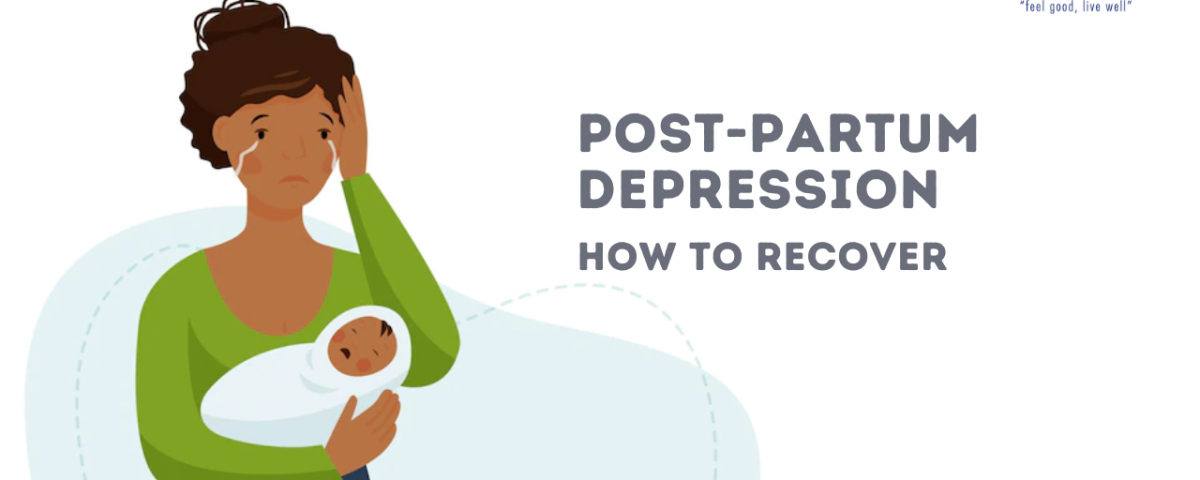Post-Partum Depression and How to Recover
You’ve finally put 40 (or so) weeks of pregnancy and long hours of childbirth behind you, and you’re officially a mother. Congratulations!
Now comes the transition from pregnancy to postpartum, which brings with it a variety of new symptoms and questions. No matter how you gave birth, the first six weeks postpartum are considered a “recovery” period. Every new mother is different, so every woman will recover at a different rate with different postpartum symptoms.
For some, the joy of motherhood can quickly give way to feelings of sadness. If you have a case of the “baby blues,” know that it’s a normal and common side effect of childbirth caused by hormonal changes. And this too shall pass, usually within a few weeks. But if those feelings linger or worsen over time, you could be experiencing postpartum depression (PPD), a more serious and prolonged condition.
Post-partum depression is a serious mental illness that affects your behaviour and physical health. A new baby can bring in a variety of emotions, from joy and happiness, to anxiety, fear, and guilt. Unfortunately, postpartum can result in depression.
Postpartum depression can include feeling unconnected to your baby, feeling like you are not the baby’s mother, or you may not feel love or care towards your baby.
If you feel like this, you are not alone! Approximately 15-20% of Australian mothers experience varying degrees of postpartum depression and anxiety.
SYMPTOMS OF POSTPARTUM DEPRESSION
After pregnancy, symptoms can become prevalent that are similar to those of depression. Mothers can feel overwhelmed when their babies come home. Symptoms can vary from mild to severe. It can be hard to distinguish between baby blues, and postpartum depression. The most distinctive difference is the severity and the duration of the symptoms.
BABY BLUES
Baby blue can last only a few days to a week or two, after your baby is born. These symptoms may include:
- Crying
- Reduced concentration
- Loss of appetite
- Difficulty sleeping
- Sadness
- Mood wings
- Anxiety
- Increased irritability
POST-PARTUM DEPRESSION SYMPTOMS
Often, postpartum depression can be mistaken for baby blues – however postpartum depression will eventually interfere with your everyday life, and your ability to care for your baby. The effects can result in difficult to complete daily tasks. Symptoms develop within the first weeks after giving birth. However, they can begin earlier, during, or later – up to a year – after pregnancy.
These symptoms may include:
- Persistent feelings of sadness, guilt, emptiness, hopelessness
- Overeating or loss of appetite
- Hopelessness
- Restlessness
- Severe anxiety and panic attacks
- Thoughts of harming yourself, or your baby
- Suicidal thoughts
- Insomnia, or oversleeping
- Depressed and severe mood swings
- Crying constantly
- Difficulty bonding with your baby
- Withdrawal
- Memory problems
- Experiencing headaches, aches, and pains.
WHAT CAUSES POST-PARTUM DEPRESSION?
There’s no one cause of postpartum depression; however, it is linked to chemical, social, and psychological changes that happen when having a baby. The dramatic drop in estrogen and progesterone after you give birth may play a role. Other hormones produced by your thyroid gland also may drop sharply and make you feel tired, sluggish and depressed.
Emotional feelings of shame, guilt, or embarrassment about feeling depressed when they feel they are supposed to be happy may also contribute to postpartum depression. The expectation of being a ‘good mother’ can cause women to keep their feelings and symptoms to themselves. Most new mothers experience the “baby blues” after delivery, and about 1 out of every 10 of these women will develop a more severe and longer-lasting depression after delivery. This does not mean you are a bad mum. You, and your baby do not have to suffer. There is help.
Dads aren’t immune either! Research shows that about 1 in 10 new fathers get depression during the year their child is born.
IS POST-PARTUM DEPRESSION AFFECTING YOU?
If postpartum depression is affecting you, CBT Professionals’ is here to help! Postpartum depression is treated differently, depending on the type of symptoms and how severe they are and our dedicated psychologists are highly trained and passionate about tailoring a unique treatment plan to help you through postpartum depression. We understand that every person is different, and structure our treatment plans to fit your individual needs.
With three convenient practice locations to choose from, contact us now via telephone or online enquiry via www.cbtprofessionals.com.au to book an appointment and take that first step. Fill in referral form here!
Helensvale: (07) 5551 0251
Mount Gravatt: (07) 3102 1366
Nerang: (07) 5668 3490
If you require urgent help, please reach out to organisations like Beyond Blue. If you are in crisis and require urgent support, please call Lifeline on 13 11 14, or please contact 000 or visit your local emergency department.
Disclaimer: Content on this website is provided for education and information purposes only and is not intended to replace advise from your doctor or registered health professional. Readers are urged to consult their registered practitioner for diagnosis and treatment for their medical concerns. CBT Professionals is not an emergency service – please call 000 in an emergency.
THREE CONVENIENT LOCATIONS
MOUNT GRAVATT
Mt Gravatt Medical PrecinctSE 105, 1808 Logan Rd
Upper Mount Gravatt QLD 4122


